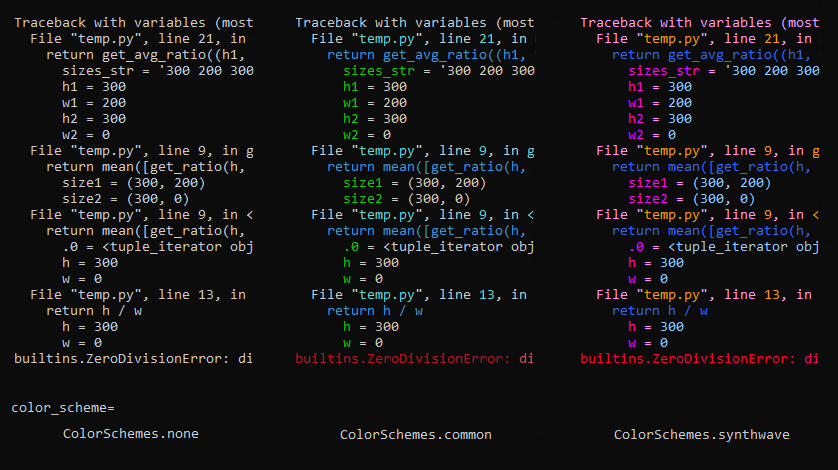traceback_with_variables
Adds variables to python traceback. Simple, lightweight, controllable. Debug reasons of exceptions by logging or pretty printing colorful variable contexts for each frame in a stacktrace, showing every value. Dump locals environments after errors to console, files, and loggers. Works in Jupyter and IPython. Install with pip or conda.
Installation
pip install traceback-with-variables
conda install -c conda-forge traceback-with-variables
? Quick Start
Using without code editing, running your script/command/module:
traceback-with-variables ...script/tool/module with arguments...
Simplest usage in regular Python, for the whole program:
from traceback_with_variables import activate_by_import
Simplest usage in Jupiter or IPython, for the whole program:
from traceback_with_variables import activate_in_ipython_by_import
Decorator, for a single function:
@prints_tb
# def main(): or def some_func(...):
Context, for a single code block:
with printing_tb():
Work with traceback lines in a custom manner:
return '\n'.join(iter_tb_lines(e))
Using a logger [with a decorator, with a context]:
with printing_tb(file_=LoggerAsFile(logger)):
# or
@prints_tb(file_=LoggerAsFile(logger)):
Colors

How does it save my time?
-
Turn a code totally covered by debug formatting from this:
def main(): sizes_str = sys.argv[1] h1, w1, h2, w2 = map(int, sizes_str.split()) - try: return get_avg_ratio([h1, w1], [h2, w2]) - except: - logger.error(f'something happened :(, variables = {locals()[:1000]}') - raise - # or - raise MyToolException(f'something happened :(, variables = {locals()[:1000]}') def get_avg_ratio(size1, size2): - try: return mean(get_ratio(h, w) for h, w in [size1, size2]) - except: - logger.error(f'something happened :(, size1 = {size1}, size2 = {size2}') - raise - # or - raise MyToolException(f'something happened :(, size1 = {size1}, size2 = {size2}') def get_ratio(height, width): - try: return height / width - except: - logger.error(f'something happened :(, width = {width}, height = {height}') - raise - # or - raise MyToolException(f'something happened :(, width = {width}, height = {height}')into this (zero debug code):
+ from traceback_with_variables import activate_by_import def main(): sizes_str = sys.argv[1] h1, w1, h2, w2 = map(int, sizes_str.split()) return get_avg_ratio([h1, w1], [h2, w2]) def get_avg_ratio(size1, size2): return mean(get_ratio(h, w) for h, w in [size1, size2]) def get_ratio(height, width): return height / widthAnd obtain total debug info spending 0 lines of code:
Traceback with variables (most recent call last): File "./temp.py", line 7, in main return get_avg_ratio([h1, w1], [h2, w2]) sizes_str = '300 200 300 0' h1 = 300 w1 = 200 h2 = 300 w2 = 0 File "./temp.py", line 10, in get_avg_ratio return mean([get_ratio(h, w) for h, w in [size1, size2]]) size1 = [300, 200] size2 = [300, 0] File "./temp.py", line 10, in <listcomp> return mean([get_ratio(h, w) for h, w in [size1, size2]]) .0 = <tuple_iterator object at 0x7ff61e35b820> h = 300 w = 0 File "./temp.py", line 13, in get_ratio return height / width height = 300 width = 0 builtins.ZeroDivisionError: division by zero -
Automate your logging too:
logger = logging.getLogger('main') def main(): ... with printing_tb(file_=LoggerAsFile(logger)) ...2020-03-30 18:24:31 main ERROR Traceback with variables (most recent call last): 2020-03-30 18:24:31 main ERROR File "./temp.py", line 7, in main 2020-03-30 18:24:31 main ERROR return get_avg_ratio([h1, w1], [h2, w2]) 2020-03-30 18:24:31 main ERROR sizes_str = '300 200 300 0' 2020-03-30 18:24:31 main ERROR h1 = 300 2020-03-30 18:24:31 main ERROR w1 = 200 2020-03-30 18:24:31 main ERROR h2 = 300 2020-03-30 18:24:31 main ERROR w2 = 0 2020-03-30 18:24:31 main ERROR File "./temp.py", line 10, in get_avg_ratio 2020-03-30 18:24:31 main ERROR return mean([get_ratio(h, w) for h, w in [size1, size2]]) 2020-03-30 18:24:31 main ERROR size1 = [300, 200] 2020-03-30 18:24:31 main ERROR size2 = [300, 0] 2020-03-30 18:24:31 main ERROR File "./temp.py", line 10, in <listcomp> 2020-03-30 18:24:31 main ERROR return mean([get_ratio(h, w) for h, w in [size1, size2]]) 2020-03-30 18:24:31 main ERROR .0 = <tuple_iterator object at 0x7ff412acb820> 2020-03-30 18:24:31 main ERROR h = 300 2020-03-30 18:24:31 main ERROR w = 0 2020-03-30 18:24:31 main ERROR File "./temp.py", line 13, in get_ratio 2020-03-30 18:24:31 main ERROR return height / width 2020-03-30 18:24:31 main ERROR height = 300 2020-03-30 18:24:31 main ERROR width = 0 2020-03-30 18:24:31 main ERROR builtins.ZeroDivisionError: division by zero -
Free your exceptions of unnecessary information load:
def make_a_cake(sugar, eggs, milk, flour, salt, water): is_sweet = sugar > salt is_vegan = not (eggs or milk) is_huge = (sugar + eggs + milk + flour + salt + water > 10000) if not (is_sweet or is_vegan or is_huge): raise ValueError('This is unacceptable, guess why!') ... -
— Should I use it after debugging is over, i.e. in production?
Yes, of course! That way it might save you even more time. (watch out if your variables have personal data, passwords etc. Filters with be introduced in next versions very soon)
-
Stop this tedious practice in production:
step 1: Notice some exception in a production service.
step 2: Add more printouts, logging, and exception messages.
step 3: Rerun the service.
step 4: Wait till (hopefully) the bug repeats.
step 5: Examine the printouts and possibly add some more info (then go back to step 2).
step 6: Erase all recently added printouts, logging and exception messages.
step 7: Go back to step 1 once bugs appear.




